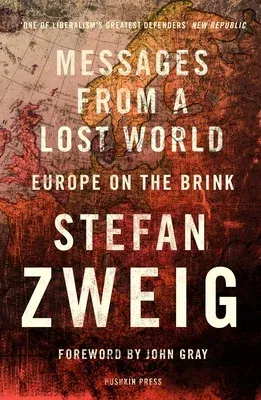Stefan Zweig
(Author)Messages from a Lost World: Europe on the BrinkPaperback, 18 April 2017

Qty
1
Turbo
Ships in 2 - 3 days
Only 2 left
Free Delivery
Cash on Delivery
15 Days
Free Returns
Secure Checkout

Print Length
224 pages
Language
English
Publisher
Pushkin Press
Date Published
18 Apr 2017
ISBN-10
1782272291
ISBN-13
9781782272298
Description
Product Details
Author:
Book Format:
Paperback
Country of Origin:
GB
Date Published:
18 April 2017
Dimensions:
19.81 x
12.95 x
1.27 cm
Genre:
Germany
ISBN-10:
1782272291
ISBN-13:
9781782272298
Language:
English
Pages:
224
Publisher:
Weight:
181.44 gm